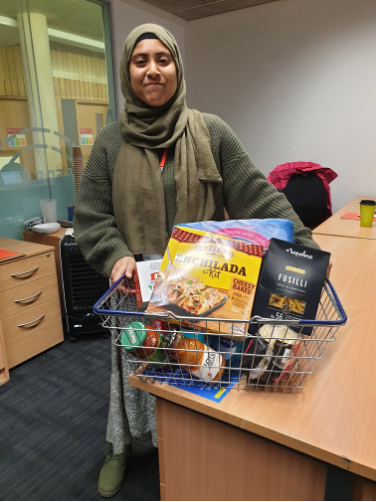
By Beds SU
Friday, 15 October 2021
If you attended the Freshers’ Fairs at either the Bedford or Luton Campus in Welcome Week, you may have noticed a couple of shopping baskets containing everyday grocery items on the Beds SU stall. Our shopping included everyday goods such as cereals, rice, pasta, shower gel, soup, baked beans and the all-important toilet roll. As part of our experiment, one basket contained branded items, whilst the other contained “value” items. We asked you to guess the cost of each basket, with the student with the nearest guess winning the basket.
It can be tempting to stick with the brands that we are familiar with from adverts we’ve seen around us, or simply the first one we come to in the supermarket. And supermarkets know this, that’s why you’ll tend to find premium brands on the shelves at eye level, with cheaper products hidden down the bottom. When you inspect these products, they often come from the same suppliers and factories, as this viral post showed us last year – they are literally the same product, in different packaging!
In our example, the 2 baskets had a price difference of £9.74. If you shop weekly, that’s a £506.48 saving over a year just by exploring the unbranded items. Just imagine what else you could spend that money on…
Here are some of our savvy shoppers who knew the value of our baskets so took our prizes home:


You should also be wary of bad supermarket deals. From time to time, some of the deals you'll come across on your food shop can seem too good to be true... and that's because they sometimes are. Don't just trust the brightly coloured discount signs that are designed to make you think you've found a bargain. Look out for things like the “price per ml/g” for a better comparison: the big jar of coffee might be reduced, but it still might be cheaper to buy two small ones.
Our final top tip is always make a list of what you need. Not only does this mean that your cupboards are full of USEFUL things, but it also means there’s less chance of temptation or being distracted by the bright discount stickers (hmm, did we really need that large bar of chocolate?).
Top tips:
1. Explore unbranded alternatives
2. Double-check the “value” of deals
3. Make a list!
Over the course of the year we will be writing other articles to help you with common student issues. Get in touch if you’d like to suggest a topic for our Advisors to look into.

